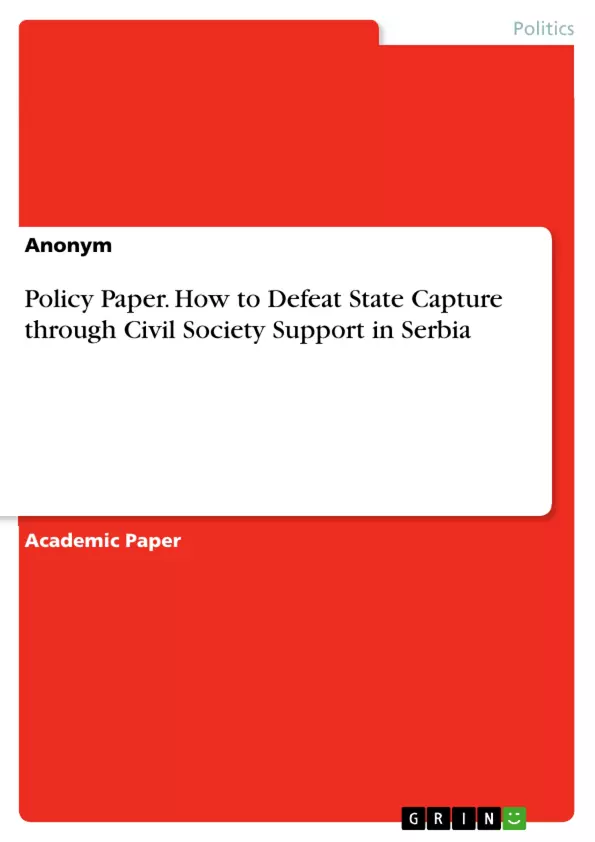Since the fall of the Milošević regime in 2000, Serbia has made some progress in its transition to a democratic society. Without pressure from the European Union (EU), many of the required changes would not have happened or would have taken place only very slowly. With the potential of becoming an EU Member State candidate, the EU is a key actor in Serbia’s transformation. The EU's strategies for the Western Balkans region are mainly incentive based. Political conditionality is considered a key instrument for successful democratization and integration into the Western community of states. The instrument aims to exert a lasting influence on democratization processes with strong incentives such as the prospect of EU membership. It should be understood as linking benefits to the fulfillment of certain conditions intended to contribute to democratization. The most effective form proved to be the conditionality of the Copenhagen criteria for the admission of Eastern European transition countries to the EU.
However, the application of the instrument has not been equally successful everywhere and can only be replicated to a limited extent in other regions. "[…] political conditionality also generates reaction, polarization and a sense of injustice in most Western Balkan countries, especially when it touches upon nationally sensitive matters and unresolved post-conflict issues". In Serbia, too, the conditionality approach has so far proved only partially successful. The country is still far from forming a consolidated democracy.According to Freedom House it is currently labeled as a "hybrid regime". Although governance effectiveness has increased under the influence of EU conditionality, the level of democracy has stagnated. Richter und Wunsch are putting "state capture as a key explanatory factor for the observed decoupling between formal compliance and democratic performance in the Western Balkans".
Inhaltsverzeichnis (Table of Contents)
- Introduction
- The EU Conditionality approach and its limits
- Additive components to the conditionality approach
- Support civil society as a counterpart to the top-down approach
- Strengthen tools for civil society
- Summarized recommendation
- Bibliography
Zielsetzung und Themenschwerpunkte (Objectives and Key Themes)
This policy paper aims to explore complementary approaches to the EU's conditionality approach, particularly in the context of state capture, by focusing on the case of Serbia. The paper analyzes the shortcomings of the EU's conditionality model in promoting democracy and outlines recommendations for strengthening the effectiveness of democracy promotion efforts by incorporating civil society support.
- The limits of the EU's conditionality approach in transitioning countries
- The phenomenon of state capture in the Western Balkans and its impact on democracy
- The role of civil society in counteracting state capture and promoting democracy
- Strategies for strengthening civil society organizations and their capacity to influence policy
- Recommendations for a more effective approach to democracy promotion in Serbia
Zusammenfassung der Kapitel (Chapter Summaries)
- Introduction: This chapter sets the stage by highlighting Serbia's progress in its transition towards a democratic society since the fall of Milošević's regime in 2000. The paper emphasizes the EU's role as a key actor in this transition and explores the challenges and limitations of the EU's conditionality approach in promoting democracy in Serbia.
- The EU Conditionality approach and its limits: This chapter delves into the EU's conditionality approach, outlining its core components and analyzing its effectiveness in promoting democratic reforms in transition countries. The chapter discusses the limitations of the approach, including the dilemma between stability and democracy, and the potential for state capture to undermine democratic progress.
- Additive components to the conditionality approach: This section explores potential additions to the EU's conditionality approach, with a focus on strengthening the role of civil society. The chapter examines strategies for supporting civil society organizations as a counterbalance to the top-down approach of conditionality and for strengthening their tools and capacity.
Schlüsselwörter (Keywords)
Key terms and concepts explored in this policy paper include state capture, democracy promotion, civil society, conditionality, European Union, Serbia, Western Balkans, and hybrid regime. The paper focuses on the challenges and opportunities for promoting democracy in transitional countries through a comprehensive analysis of the EU's conditionality approach and the importance of civil society engagement.
- Quote paper
- Anonym (Author), 2021, Policy Paper. How to Defeat State Capture through Civil Society Support in Serbia, Munich, GRIN Verlag, https://www.hausarbeiten.de/document/1357958


